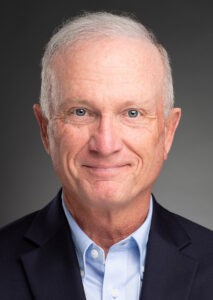The minister of my Southern Baptist childhood church was a study in contradictions. A Phi Beta Kappa graduate of my alma mater, Wake Forest University, he was an evangelical conservative; however, before my meeting with the ordination council of the local Baptist association (about 10 white males whose average age was somewhere between 75 and death) he warned me to not “take the bait,” if they brought up “biblical inerrancy,” a dog whistle for fundamentalists in that era and a “man-made word,” according to my minister.
I somehow survived that geriatric gauntlet and was ordained in the West Asheville Baptist church in 1988.

David Ramsey
In the pulpit, however, that pastor was unfailingly, supremely and consistently confident. The word “doubt” wasn’t in his theological lexicon. He spoke with authority and conviction and would squint his eyes when driving home a point.
On one Sunday, this minister was speaking on the nature of the church. He used the rhetorical device via negativa and began talking about what the church is not, and he got everyone’s attention when he said this: “The church is not an institution. The church is not an organization. The church is a divine orgasm … ORGANISM!”
Grown men were crying from laughter. Women’s faces were turning red from embarrassment. And my friends couldn’t believe what he had just said; so, one of us, after the service, went into the audio-visual booth where the services were taped and asked to “borrow” the tape with a promise to return it. We never returned the tape, but over the next few years, every now and then, we would put it into a cassette player and laugh our adolescent butts off at our minister’s malapropism.
Of all professionals, excluding scientists, ministers should be the least confident and the most circumspect from the pulpit, given the epistemological limits of philosophical discourse. We may believe in God, we may hope there is a God, but we, none of us, knows if there is a God, even and especially ministers.
Ministers, though, are often the most confident and most certain when preaching, which leads many in their audience to believe everything they say.
As a child and adolescent (who hadn’t yet developed critical thinking skills) I certainly believed most, if not everything my home church pastor said ex cathedra, as he would say, confidently, from time to time that “God has spoken to me, and this is what he said.”
One Sunday morning, he told the congregation God had not spoken to him that week. He described how he would lay prostrate on the floor of his study and receive “the word of the Lord.” On that Sunday, he said, God hadn’t spoken to him, so he didn’t have a sermon. I believed him at the time, but now I think he might have simply been lazy.
“Adults tend to vote for more confident political candidates and are more trusting of testimony from confident witnesses in mock jury trials.”
This phenomenon (not laziness) is known as the confidence heuristic. The confidence heuristic suggests that people make judgments of credibility, such as how accurate the information is or how trustworthy an individual is, based on the confidence expressed in the message or by the messenger. For example, research has shown that adults tend to vote for more confident political candidates and are more trusting of testimony from confident witnesses in mock jury trials.
In a Harvard Business Review article, Deborah Tannen relates a story of the CEO of a major corporation who once said he often has to make decisions in five minutes about matters on which others may have worked five months. He said he uses this rule: If the person making the proposal seems confident, the CEO approves it. If not, he says no.
What if he is wrong?
A person’s expression of confidence is far from a perfect correlate of credibility. Confidence can tell us what people believe to be true or what they want us to believe is true. It does not, however, always tell us what actually is true.
Confident individuals also tend to be regarded as more influential in group settings. Society rewards expressing certainty, for exuding confidence and for being authoritative and declarative.
Wharton professor Adam Grant, however, observes that when people mistake confidence for competence,” they end up valuing style over substance … and the most charismatic person in the group is the most likely to get away with a flawed argument. The most polished speaker in the room is most likely to get away with being unprepared.”
And, according to the Dunning-Keruger effect, when speakers lack competence, they’re most likely to be brimming with confidence.
“When people mistake confidence for competence, ‘they end up valuing style over substance … and the most charismatic person in the group is the most likely to get away with a flawed argument.’”
This is one of the many reasons leaders at Amazon do not use PowerPoint in meetings or presentations. Rather, leaders write six-page narratives, or six-pagers as they’re called at Amazon. Those in the room spend the first 20 minutes reading the document and the next 40 minutes engaging the writer in dialogue. Founder and former CEO Jeff Bezos said of the six pagers:
There is no way to write a six-page, narratively structured memo and not have clear thinking. The narrative structure of a good memo forces better thought and better understanding of what’s more important than what, and how, things are related.
They can’t be written in a couple of hours. The great memos are written and re-written, shared with colleagues who are asked to improve the work, set aside for a couple of days, and then edited again with a fresh mind.
Having written my share of six-pagers in my almost eight years at Amazon, and having sat through even more meetings where they were read, I can attest that the old saw, “If you can’t bedazzle them with brilliance, befuddle them with bull crap,” doesn’t work at Amazon. Clarity and content trump confidence and charisma. Data, not demagoguery, carries an argument. Bullet points are verboten, and the Chicago Manual of Style is our Bible.
Decades ago, Bertrand Russell said that “the fundamental cause of the trouble is that in the modern world, the stupid are cocksure while the intelligent are full of doubt.” Given the confidence heuristic, and the epistemic limits of knowledge, perhaps ministers should be more intellectually humble than certain, and maybe we shouldn’t believe everything a minister says from the pulpit. Especially if he doesn’t know the difference between an orgasm and an organism.
David Ramsey is an author, columnist and former Baptist minister. He is also a principal with the world’s largest online retail and cloud technology company. He holds degrees from Wake Forest University and Duke University and was a fellow at Princeton Theological Seminary. His book’s website is dbramsey.com.
Related articles:
Truth Decay: How truthfulness is related to humility | Opinion by David Gushee
‘The Sin of Certainty:’ Peter Enns’ journey from belief to trust | Opinion by Alan Bean


